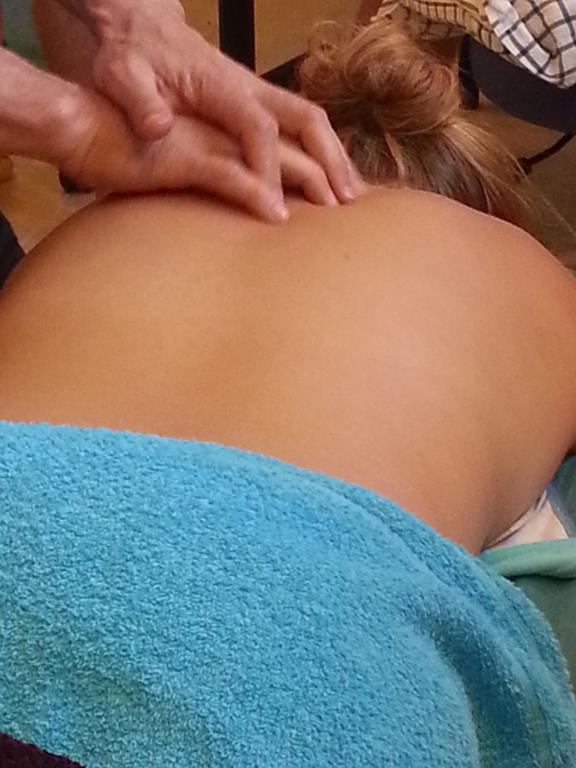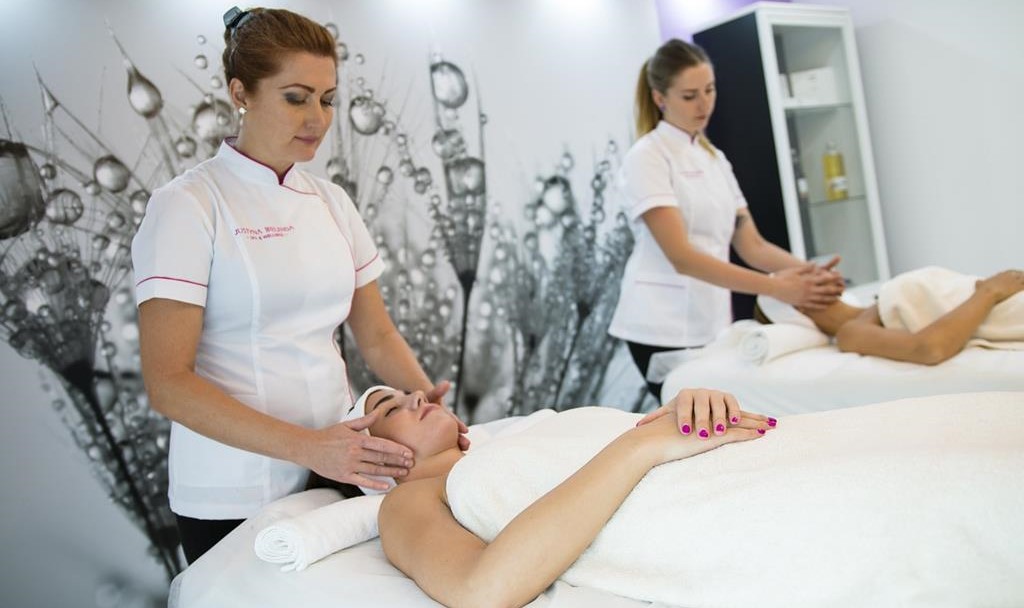Massage is addictive due to the release of feel-good hormones and stress relief. The physical touch and relaxation promote a sense of well-being and comfort, leading to a desire for repeated sessions.
Massage therapy has gained popularity as a natural remedy for stress, body aches, and overall relaxation. The physical manipulation of muscles and tissues not only reduces tension but also triggers the release of endorphins, dopamine, and serotonin, providing a natural high.
Consequently, the pleasurable sensations and relief experienced during a massage often lead to a craving for more. Additionally, the practice of mindfulness and the nurturing environment of a massage session contribute to its addictive nature. Hence, the combination of physical and emotional benefits makes massage a sought-after and addictive form of self-care.
The Science Behind Massage

Massage is not only a relaxing experience but also has a scientific basis. Understanding the science behind massage can shed light on why it is so addictive. Through its impact on the nervous system and the release of endorphins, massage provides a natural way to alleviate pain, reduce stress, and promote well-being.
Impact On The Nervous System
When receiving a massage, the pressure and manipulation of muscles and soft tissues stimulate the parasympathetic nervous system. This activation leads to a decrease in heart rate, blood pressure, and stress hormone levels. The body’s relaxation response is triggered, promoting a sense of calm and tranquility.
Release Of Endorphins
Another fascinating aspect of the science behind massage is its ability to promote the release of endorphins. These are neurotransmitters that act as natural painkillers and mood enhancers. The physical manipulation of muscles during a massage triggers the release of endorphins, leading to feelings of euphoria and well-being.
Physical Benefits Of Massage
When it comes to the physical benefits of massage, the effects go far beyond just feeling relaxed and pampered. Massage therapy offers a range of therapeutic benefits that positively impact the body’s physiological functions. Let’s delve into the reasons why massage is addictive, starting with the physical benefits.
Muscle Relaxation
One of the primary physical benefits of massage is muscle relaxation. Through the application of pressure and manipulation of soft tissues, massages help release tension and tightness in the muscles. This process promotes blood flow to the areas, which aids in the removal of metabolic waste and reduces muscle soreness. The release of muscular tension also contributes to an increased range of motion and flexibility.
Improved Circulation
Massage therapy plays a crucial role in improving circulation throughout the body. The manipulation of soft tissues helps to dilate blood vessels, allowing for better blood flow. This enhanced circulation brings vital nutrients and oxygen to the tissues, promoting faster healing and rejuvenation. By improving blood flow, massages also assist in the removal of toxins and metabolic waste from the body, contributing to overall health and wellbeing.
Psychological Effects Of Massage
Discover the allure of massage addiction lies in its ability to release endorphins, reducing stress and promoting relaxation. The psychological effects of massage create a sense of well-being that keeps clients coming back for more.
Reduction In Stress And Anxiety
Massage helps reduce stress levels and alleviate anxiety, promoting overall relaxation.
Enhanced Mood
Through massage, a person’s mood can be uplifted, leading to a sense of well-being.

Credit: wishrehab.com
The Role Of Touch In Human Connection
The power of human touch goes beyond physical sensations and can have a profound impact on our emotional well-being. Touch is a universal language that transcends words, allowing us to communicate and connect on a deeper level. In fact, our need for touch is so fundamental that it is wired into our biology from the moment we are born. From our earliest experiences, touch plays a vital role in shaping our relationships, fostering a sense of safety and trust, and ultimately fueling our addiction to massage.
The Power Of Human Touch
Human touch has a unique ability to soothe and heal. When we receive a massage, our bodies respond by releasing oxytocin, often referred to as the “love hormone.” Oxytocin induces feelings of calmness, relaxation, and contentment, creating a heightened sense of well-being. This surge of oxytocin not only enhances our mood but also helps to reduce stress, anxiety, and depression. As a result, we become hooked on the positive emotions and physical relief that massage provides.
Bonding And Trust
In addition to its emotional benefits, touch plays a crucial role in bonding and building trust. When we engage in positive physical contact, such as receiving a massage, our brains release another hormone called serotonin. Serotonin is responsible for regulating our mood and promoting feelings of happiness and satisfaction. Through massage, we not only experience the immediate benefits of serotonin release, but we also build a stronger bond with our massage therapist, deepening trust and facilitating a positive therapeutic relationship.
Addictive Elements Of Massage
Have you ever wondered why a single massage session can leave you craving for more? The truth is, there are several elements that make massage so addictive. From the repeated release of feel-good hormones to the overwhelming desire for stress relief, each aspect plays a role in keeping you coming back for more.
Repeat Release Of Feel-good Hormones
Massage therapy triggers the release of endorphins, serotonin, and dopamine – the trio of hormones responsible for giving you that euphoric feeling. The gentle kneading and pressure applied during a massage session stimulate the production of these hormones, flooding your body with a sense of relaxation and pleasure. As these feel-good chemicals spread, tension and stress melt away, leaving you in a state of pure bliss. The regular repetition of this hormone release during massage sessions can create a powerful addiction to the profoundly positive emotions it generates.
Desire For Stress Relief
In today’s fast-paced world, stress is an unwelcome companion that can drain your energy and affect your overall well-being. Massage provides an effective outlet to combat stress and its associated negative effects. The calming atmosphere, soothing touch, and rhythmic movements of a massage session work together to relieve not only physical tension but also mental and emotional stress. As your muscles relax and your thoughts settle, you find yourself yearning for that release from the pressures of daily life. Time spent on the massage table becomes an escape, a brief respite where you can truly let go and unwind.
The addictive nature of massage lies in its ability to address the intense desire for stress relief, becoming a much-needed source of relaxation and rejuvenation. It offers a safe and natural way to combat the daily grind, leaving you craving the next session to experience that profound sense of calm and tranquility once again.

Frequently Asked Questions
Why Do People Get Addicted To Massages?
People can become “addicted” to massages for several reasons:
-
Physical Benefits: Massages provide various physical benefits, such as reducing muscle tension, improving circulation, relieving pain, and promoting relaxation. These positive effects can make people feel better physically and motivate them to seek massages regularly to maintain these benefits.
-
Stress Relief: Massages are well-known for their stress-relieving effects. They can help reduce levels of stress hormones like cortisol while increasing the release of feel-good hormones like serotonin and dopamine. As a result, people may become addicted to massages as a way to manage and alleviate stress in their lives.
-
Pleasurable Sensations: Massages often elicit pleasurable sensations, such as the feeling of tension being released, warmth spreading through muscles, and the overall sense of relaxation and well-being. These sensations can be highly enjoyable and lead people to crave more massages to experience them again.
-
Self-Care Ritual: For some individuals, getting a massage becomes an essential part of their self-care routine. It provides them with dedicated time to focus on themselves, relax, and rejuvenate, which contributes to their overall well-being and quality of life.
-
Health Maintenance: Regular massages may contribute to better overall health and wellness by improving flexibility, boosting immune function, and reducing the risk of certain health issues. Consequently, people may continue receiving massages as a preventive measure to maintain their health and vitality.
-
Emotional Comfort: Massages can also provide emotional comfort and support, especially for those dealing with loneliness, anxiety, or depression. The caring touch of a massage therapist and the nurturing environment of a spa can offer solace and a sense of connection.
While “addiction” to massages may not have the same negative connotations as addiction to substances, it reflects the strong desire and perceived benefits that individuals associate with regular massage therapy. However, it’s essential for individuals to maintain balance and ensure that their massage habits align with their overall well-being and lifestyle.
Why Does My Body Crave Massages?
Massage can relieve muscle tension and improve circulation, satisfying the body’s need for relaxation. Additionally, it boosts overall well-being and reduces stress, which the body craves.
Why Do I Like Massages So Much?
People often enjoy massages because they provide physical benefits like reducing muscle tension and pain, improving circulation, and promoting relaxation. Massages also offer a sense of pampering and self-care, can foster a connection through human touch, and may improve sleep quality. The release of feel-good hormones during massages contributes to their pleasurable effects, making them enjoyable and potentially addictive.
Why Do Massages Relax You So Much?
Massages relax you because they relieve muscle tension, reduce cortisol levels, increase serotonin and dopamine, promote better sleep, and improve overall mood and well-being.
Conclusion
Discover the allure of massage therapy and its addictive nature. From relaxation to pain relief, massages offer holistic benefits that captivate individuals. The soothing touch and rejuvenating effects create a desire for more. Embrace the addictive bliss of massages to enhance your well-being and overall quality of life.



